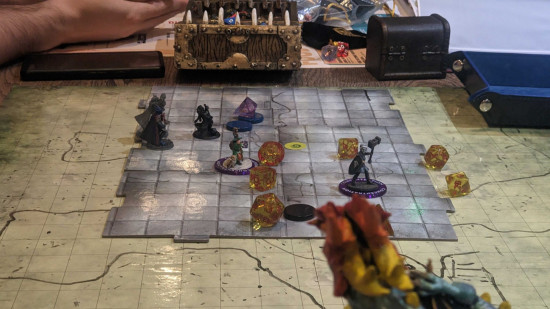Dungeons and Dragons players have had access to digital gaming tools for years now, but in 2024, the game feels more online than ever. Sites like Roll20 and D&DBeyond have fully replaced the need for dice, character sheets, and for players to even be in the same room. Discord has integrated Roll20 to make that online experience even more seamless, and some DMs are even automating the creative process using AI.
Perhaps this comes across a bit ‘old man yells at cloud’, but I’m not loving this tech-y tabletop RPG Renaissance. The more technology can do for me in my campaign, the less I want it there.
To clarify, this isn’t some ‘holier than thou’ tirade. There’s still a laptop behind my Dungeon Master screen during Curse of Strahd, even if we have a copy of the Player’s Handbook at the table. While I’m much more comfortable calculating attack modifiers in my head, many of my players rely on D&DBeyond to remember the rules for them. And, in fact, my Strahd game is a hybrid – one week in person and one week online – to fit with the group’s schedules.
So no, I’m not immune to the ease of use that comes with digital D&D. I’ve accepted this cyborg version of Dungeons and Dragons for several years now, but lately, I long for the analog. In a world increasingly invaded by Artificial Intelligence, emerging tech, and the like, I’m starting to seriously crave human connection. The truth is, the one thing that technology cannot replace is face-to-face communication.
There are subtleties that cannot be picked up on when you cannot see who you’re speaking to. The slight delay when speaking over a voice call regularly hampers communication, so conversations take longer to convey their meaning – or become stifled to minimize digital interference. And – let’s not kid ourselves – it is so easy to zone out from another player’s dialogue when no one can see if you’re paying attention.
Take, for example, my most recent session of Curse of Strahd. The previous session was left on a major cliffhanger, as the party had just been caught sneaking into Castle Ravenloft by Rahadin, Strahd’s chamberlain. The group weren’t confident that they were powerful enough to win a fight against him, if things happened to turn sour.
As luck would have it, things went sour very quickly. Panic ensued. However, luck goes both ways, so the party also managed to cast Banishment on Rahadin and buy themselves some time. They used it to plan an all-out siege on the target when he blipped back to their plane of existence.
This resulted in a few hours of chaotic, panicked planning. The conversation grew excited, fueled by the adrenaline of the scenario. The Player’s Handbook was flipped through at a speed I’d never before seen. Everyone had a role to play and a way to take a stab at Rahadin. Once he returned, they whaled on him.
A triumphant victory was earned, and everyone left the table feeling pretty good about their choices. On our way out, one player said to me: “I’m so glad we played this one in person. It wouldn’t have felt the same online.”
They were right, I realized. Some of that magic would have been lost if we weren’t in the same room. In fact, all my favorite memories from this DnD campaign have been in person. When we meet to play, we take pictures of these moments, and I regularly look back on them with nostalgia. I delight in bringing a new prop or tool to the table, and everyone has a custom DnD miniature that takes pride of place in front of them.
Technology certainly does have a place in the world of Dungeons and Dragons. I’m aware that some fans have disabilities that might prevent them from playing without digital assistance, and others simply can’t join an in-person group thanks to geography. These people have as much of a right to play D&D as everyone else. Heck, Discord saved our Strahd game from hiatus when one player was hospitalized – it meant she could still join for sessions.
However, for those of us who have the choice between digital and analog D&D, I’d urge you not to forget the latter. D&DBeyond may make learning how to play Dungeons and Dragons easier, but you’ll find it far more rewarding in the long term to learn how your character works the old-fashioned way. There’s so much joy in seeing another player react with delight or dismay to an imaginary scenario. And nothing – nothing replaces the satisfaction of rolling actual dice and hearing them hit the table.
Looking to roll up a character? Here’s everything you need to know about DnD classes and DnD races. Or, if you’d prefer to get your info from a paper book, be sure to check out our 2024 Player’s Handbook review.
Source: Wargamer




